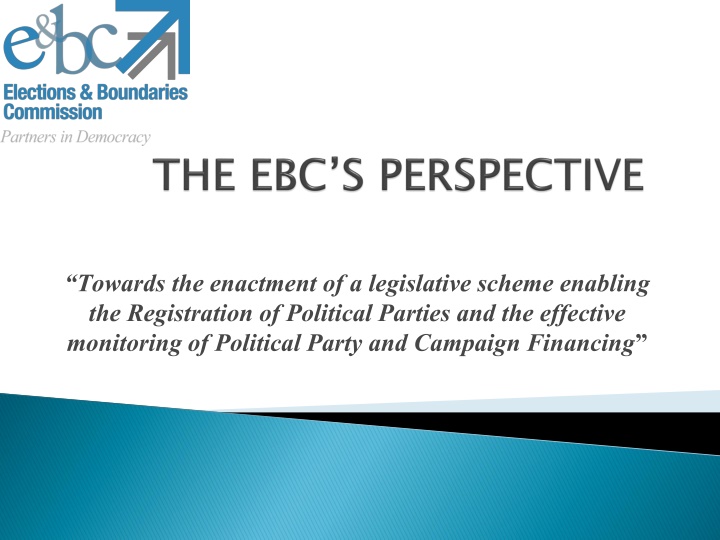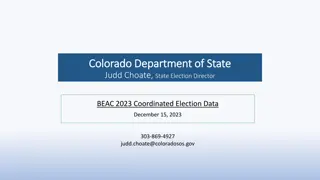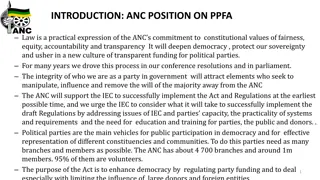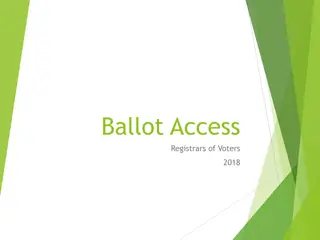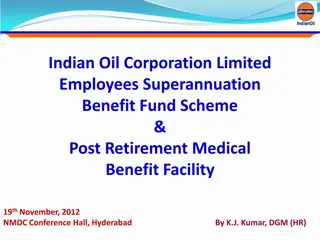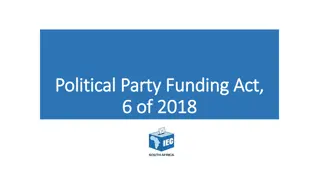Enacting Legislative Scheme for Political Party Registration & Financing Monitoring
Enabling registration of political parties and monitoring campaign financing is crucial for political reform. Key components include registration, reporting, expense limits, public funding, and compliance mechanisms.
Download Presentation

Please find below an Image/Link to download the presentation.
The content on the website is provided AS IS for your information and personal use only. It may not be sold, licensed, or shared on other websites without obtaining consent from the author.If you encounter any issues during the download, it is possible that the publisher has removed the file from their server.
You are allowed to download the files provided on this website for personal or commercial use, subject to the condition that they are used lawfully. All files are the property of their respective owners.
The content on the website is provided AS IS for your information and personal use only. It may not be sold, licensed, or shared on other websites without obtaining consent from the author.
E N D
Presentation Transcript
Towards the enactment of a legislative scheme enabling the Registration of Political Parties and the effective monitoring of Political Party and Campaign Financing
The Parties have conceptually agreed, that to address the critical issues of political finance implementation finance regulatory regime. Commission and the Political reform, requires new the of a political
Five key components were identified as crucial to such a regulatory regime s success: 1. Registration of political parties 2. Reporting and publication of information 3. Limits on election expenses and contributions 4. Public funding; and 5. Compliance and enforcement mechanisms anisms
Registration of Political Parties Registration of Political Parties The Representation of the People Act Chap. 2:01 (ROP) provide the necessary conditions under which political parties are to be registered, or new legislation be enacted to deal with the issue. The basic requirements are stated hereunder. should either be amended to
Provisions for the Registration of Political Parties shall address the following:- 1. Responsibility administering the Office of Registrar of Political Parties and maintaining a Register of Political Parties; and 2. Guidelines for the creation of a political party, its legal recognition, registration and de-registration. of the Commission for
To achieve registration a political party would be required to submit the following to the Office of Registrar of Political Parties: a. addresses and telephone numbers of a specified number of members in good financial standing. full name of the party and the names, b. short form of the party name or abbreviation, if any.
c. names and addresses of the leader or president, the secretary, the treasurer, the nominating designated as officers of the party; d. address of the office of the party where the records of the party are maintained and to which communications may be addressed; and e. Constitution or charter of the party officer and other persons
Registration of Political Parties will also cover 1. Criteria registered parties; 2. Voluntary deregistration guidelines; 3. Involuntary deregistration i.e. circumstances under deregistered by the Office of the Registrar for Merging of two or more which political parties would be
Once registered, a political party must comply with the remaining key components of the regulatory regime and their respective legal obligations. Additionally, several incentives for political parties will also be linked to their proper registration.
These may include: financial benefits such as the ability to provide tax receipts for contributions; a specified percentage of election expenses;
the entitlement to free and paid broadcasting time; and eligibility to receive public funds on a quarterly basis when they obtain a certain threshold of votes.
Aim accountability within political party financing. - to ensure greater transparency and Registered political parties shall maintain financial records prepared in accordance with generally accepted accounting principles. The financial records of a registered political party shall approved Commission within ninety days after the close of the financial year of the party be audited by by an independent and auditor the Elections Boundaries
Financial records shall include: Copies of all cheques, money orders and credit card records appropriately signed. Written loan agreements and copies of the cheques, money orders, credit card records or receipts for cash connected to the receipt and repayment of loans. Declaration of Donors
Legislative financing shall: 1. State what a contribution is; 2. Identify which political party official can receive registered political party; 3. Identify sources of contributions i.e. who can the party accept a contribution from, eg. legal entities, natural persons; Provisions governing political contributions on behalf of the
4. State who Impermissible donors are: a) foreign governments or their agents or agencies; b) government organizations government owns shares; Public institutions, and or statutory quasi-government company bodies, any in which
5. State limits on Contributions to Candidates and Political Parties; 6. contributions. It should be mandatory that both contributions that have been kept and or returned should be recorded. Provide for recordkeeping of all
7. Stipulate the Commissions authority to compel disclosure from the banks and other financial accounts and financial records parties 8. impermissible donors be returned within a specified time. institutions and audit all bank of political Mandate that contributions from
Public funding can be approached either directly, in the form of reimbursements of election expenses and allocation of on-going allowances or subsidies or indirectly, through monetary incentives such as tax credits to donors political entities through the allocation of free broadcasting time and access to electoral products such as electoral maps and lists of electors. and nonmonetary incentives to
Candidates percentage of the popular vote to be entitled to reimbursement of a specified percentage of their election expenses. Reimbursements of election expenses should also be prescribed for political parties that receive national popular vote or at least a designated percentage of the votes in the electoral districts in which they fielded candidates. should receive a stipulated a stipulated percentage of the
The percentage reimbursement of election expenses considered could be as much as fifty percent (50%). It is also recommended that political parties who qualify for reimbursement of election expenses (perhaps on a quarterly or other periodic basis) determined by the number of votes cast election. also qualify for an allowance for the parties in the last general
Provision of free or discounted media will afford candidates broadcasts or publish printed messages at a reasonable cost (the lowest rate charged the best customer) or perhaps even no cost. political parties opportunity and individual present an to
It is recommended that the EBC be established as the political finance regulator. In a society as small as Trinidad and Tobago, the expense of setting up another would be exceedingly high and implausible. statutory commission or organization
Further, Commission is already mandated to register voters and conduct elections, it is currently best situated to be the political finance regulator. one can argue that since the
Additionally, consultations there was consensus among the political parties that the Commission is the best placed to be the regulator. during the bi-lateral
However, the Commission acknowledges that if this were done, it would be necessary for the professional credentials on both a full-time and part-time basis as in Canada. Commission to employ with a appropriate host of staff the
Through the establishment of the Office of the Director of Campaign & Public Financing, the powers including; clear authority to enforce the political finance laws forums; Commission shall have full oversight in administrative, civil and criminal
power proceedings against offenders of the political finance laws; and access to a range of penalties and sanctions. to impose sanctions or initiate
Based earlier, the Commission awaits Government s implementation of the required legislation. on the five guidelines mentioned
1. Registration of political parties 2. Reporting and publication of information 3. Limits on election expenses and contributions 4. Public funding; and 5. Compliance and enforcement mechanisms anisms
